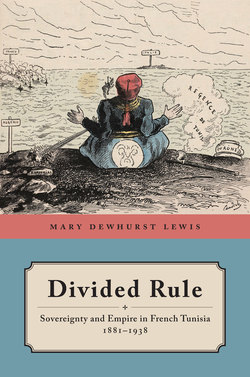Divided Rule

Реклама. ООО «ЛитРес», ИНН: 7719571260.
Оглавление
Mary Dewhurst Lewis. Divided Rule
Отрывок из книги
THE AHMANSON FOUNDATION has endowed this imprint to honor the memory of
FRANKLIN D. MURPHY who for half a century served arts and letters, beauty and learning, in equal measure by shaping with a brilliant devotion those institutions upon which they rely.
.....
That perception was not lost on the Italians themselves, who, by the late 1880s, saw in the heightened French attacks on Italian crime an opportunity to petition for a return to consular justice.93 As one petition scorned sarcastically, “The delinquent is always an Italian, the police always arrest Italians, and only Italians must be capable of delinquency.”94 A similar Italian petition, signed by an astounding 1,800 persons (or about 11 percent of the Italian population of Tunisia), added the grievance that in “civil cases [he] who is not Italian is always right” before concluding that “where there is written Liberty, Equality, Fraternity, for the Italian is written No Liberty, No Equality, No Fraternity.”95 For the Italian consul, Nicola Squitti, the French attacks on Italians were manifestations of France’s own insecurity, demonstrating that the French had “not resigned themselves to seeing us still wield a great deal of influence in Tunisia.” It was this that explained the “quotidian spectacle of war against Italians in Tunisia.”96 Under the circumstances, Squitti supported the petitioners’ request to reestablish consular justice for, in suspending it, Italy had ceded the “only weapon we had in hand.”97 Among the advantages of rescinding Italy’s compliance with a French-administered justice system? “It would give birth to the idea that Tunisia has not fallen completely and forever under French authority [potestà].”98 In response to another petition from 1889, this one signed by 1,165 Italian residents of Tunisia, the Italian undersecretary of state for foreign affairs, Abele Damiani, pledged to denounce the protocol of 1884, by which Italy had agreed to suspend its consular jurisdiction.99 It was probably no accident that these complaints came during Francesco Crispi’s tenure as foreign and prime minister, given that Crispi was modern Italy’s most ardent supporter of an Italian presence in Africa to date. Italy did not, of course, make good on its threat. But this did not prevent the Italian government from raising the specter of reestablishing its consular jurisdiction for a second time in 1893 and yet again in 1895.100 The fact that the Italian government had “suspended” rather than abolished its consular jurisdiction remained a weapon in Italy’s arsenal.
Although the British government had not used the term suspended in its agreement to close its court, it also found reason in the late 1880s to defend its understanding of where French sovereignty started and stopped and where its own prerogatives remained. Within the domain of criminal law, perhaps the most contentious issue was the fate of Paolo (sometimes rendered Pablo or Pedro) Lia, a Maltese subject who in 1866 had been found guilty of manslaughter by an Algiers court in absentia and sentenced to death. Lia had long since moved from Algeria to Tunisia, where he was arrested twenty years after his conviction on an order from the Algiers procureur to appear in court back in Algeria. The British consul in Algiers, Robert Lambert Playfair, questioned the legality of the arrest, “Tunis not being French territory.”101 As the time for Lia’s appearance before the Algiers Assize Court drew near, the correspondence on the affair became more insistent: The Tunis consul general, Thomas B. Sandwith, wished to “resist by every means Lia’s deportation to Algiers,” noting that “as no Extradition treaty exists between France and Tunis, a British subject cannot be deported thence to French territory.”102 Reacting to Playfair’s latest dispatch, Julian Pauncefote, the permanent undersecretary at the foreign office, wrote on it: “My view is that the Bey of Tunis cannot any more than the Sultan of Turkey or the Emperor of China surrender a British Subject to a Third Power”—the Third Power in this case being France, since France’s official role in Tunisia was to protect the bey’s government. And, he continued, “[t]he French cannot exercise greater powers than the Bey.”103 The next reader of the dispatch, with the initials WED (probably William Edward Davidson, the foreign office legal adviser), concurred. Britain had allowed British subjects to come under the jurisdiction of French courts in Tunisia, “but she ha[d] waived nothing more” of their rights. Since it was clear that the bey could not have, prior to the advent of the protectorate, “surrendered a British subject to the French authorities in respect of a crime committed in French territory,” Davidson wondered “how can it possibly be contended that the French can without our consent, exercise greater powers over British subjects than it was in the competence of the Bey, from whom they derive their title, to grant them?” Concluding his remarks, Davidson wrote, “I cannot doubt that this is an outrageous assumption on the part of the French or that we must enter [?] and maintain a strenuous protest against it.”104 Pauncefote then concluded the exchange of views, this time directing his remarks to Lord Iddesleigh, the foreign minister: Britain should protest against sending Lia to Algiers and should oppose French efforts to “exercise any Jurisdiction over him in respect of an offence committed outside of the Regency.”105 The French, too, were determined to stand their ground: “This protest cannot affect the course of French justice,” the Algiers procureur told Playfair.106 And yet the British did succeed in forcing the French to (forgive the pun) play fair: Britain blocked Lia’s extradition to Algeria and, as of January 1887, the charges against Lia were dropped—perhaps in part due to protests from Tunisia’s Maltese community (even the British consul “was not prepared for the extent of the sympathy which this man’s cause has called forth”).107 No wonder that, soon thereafter, France initiated treaty discussions regarding criminal extradition with Britain and Italy.
.....